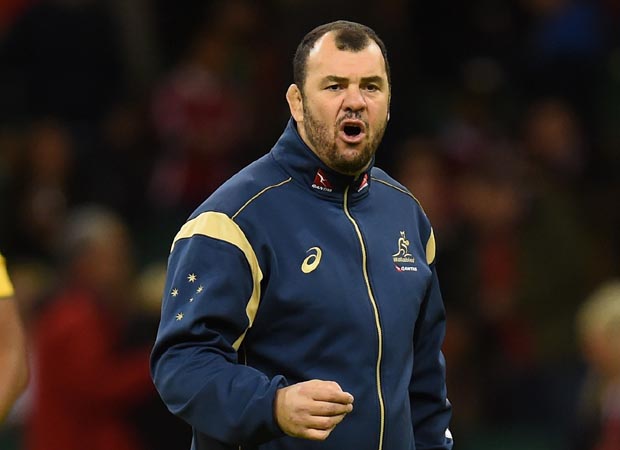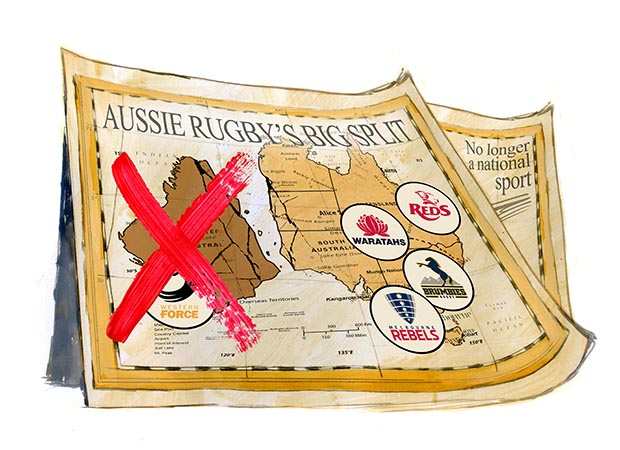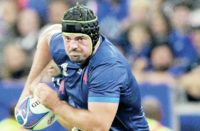 The Aussies are used to baking hot temperatures and droughts, but as sporting meltdowns go they do not come much worse than the one experienced by Rugby Union in Australia this week.
The Aussies are used to baking hot temperatures and droughts, but as sporting meltdowns go they do not come much worse than the one experienced by Rugby Union in Australia this week.
We knew that the game Down Under was not in a good place with the failure of the Australian Super Rugby teams to win a single game against their New Zealand counterparts this season, but things took a dramatic turn for the worse on Friday when the ARU announced the axing of the Western Force as one of their five professional franchises.
The uproar over the decision to wind up the Perth-based Force is based on a widespread belief that it is a strategic blunder that will kill the 15-a-side code in Western Australia. The crash-and-burn scenario did not improve when the hapless captain of the ship, ARU chief executive Bill Pulver, made sure he was one of the first in the lifeboats by simultaneously announcing his resignation.
Former Wallabies coach Bob Dwyer said the Force decision was a “catastrophe” for the game in Australia, and he launched a scathing attack on the ARU and their departing chief executive, declaring it the biggest fiasco he had seen in the game.
Dwyer said: “Even though it's a horrendous decision for WA, some good has come out of it – and that is Bill has resigned… whatever happens after that can only be a step forward. How he would know anything about the pursuit of excellence or greatness, I'll never know. There is nothing that has come out of this that gives anyone any confidence that they know what they're doing, where they want to go, and how to get there.”
There were misgivings when Pulver, a multi-millionaire Sydney businessman was appointed in 2013, because his experience was in the corporate world rather than sports administration. Pulver made his fortune by using his expertise in internet data monitoring to create an audience measurement company, NetRatings.
Those misgivings appear to have been well founded because for most of his four-year tenure the ARU have lacked authority and been indecisive – which is not altogether surprising given that Pulver talked like a walking balance sheet when he took the job.
This is why it was no surprise when Michael Foley, then ironically the coach of the Western Force, made the disgraceful decision to degrade the fixture against the 2013 Lions by resting his key players he was not told to reverse it, or look for another job, by Pulver.
 As an outsider looking in, there have been signs that this crisis has been brewing for a long time. Where the other main football codes in Australia – with Australian Rules and Rugby League in the vanguard, and soccer also growing in popularity – have all been aggressive in their plans for expansion and in their marketing, Rugby Union has been far too insular and passive.
As an outsider looking in, there have been signs that this crisis has been brewing for a long time. Where the other main football codes in Australia – with Australian Rules and Rugby League in the vanguard, and soccer also growing in popularity – have all been aggressive in their plans for expansion and in their marketing, Rugby Union has been far too insular and passive.
Aussie Rules has made huge headway by taking its own coaching programmes into schools free of charge, and has reaped the benefits in terms of expansion and cherry-picking talented athletes. That it has been able to do so, when, unlike Rugby Union, it is a sport that is essentially only played in Australia is hard to comprehend.
In such a fiercely competitive sporting marketplace most nations lucky enough to have had a player as outrageously gifted as David Campese might have had the wit to engage him, and other great Wallabies, as schools ambassadors. Their participation in spectacular arenas around the world gives them a global dimension that Aussie Rules simply does not have, including the all-important gold standard of international competition.
The flip side of the coin is that Rugby Union in Australia has developed something of a hand-out culture which has become dependent on World Rugby funding from World Cups, and from the 12 year bonanza from Lions tours, to bail it out of tight financial corners.
This lack of a rigorous self-help mentality in the ARU has been reflected in a poor domestic competition structure, illustrated by the scrapping of the Australian Rugby Championship just before Pulver took office, as well as a lack of support for community rugby.
Lastly, how is it that Rugby Union in Western Australia can be cut adrift when – in a massive continent – two of Australia's franchises, the Waratahs (Sydney) and the Brumbies (Canberra), are only a three and a half hour drive away from each other. Furthermore, while the Rebels are double that drive-time in Melbourne, they are another amalgamation option, especially as they are the youngest of the Australian Super franchises.
With none of these sides playing to anything like full houses they present the most obvious amalgamations of the lot, particularly if the aim is to make sure that the game is played nationwide.
The only problem is that a clear logistical plan, and common sense, appear to have been absent at the ARU for some time.


























